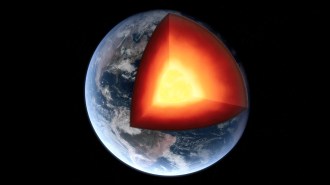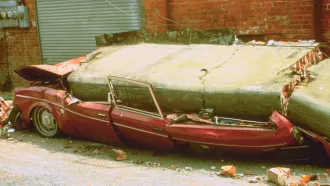Earth/Environment
Earthquake risk in Chile, plus an ancient Greek island and casino pollution in this week’s news
Andes quake risk
People living on the west side of the Andes generally expect large earthquakes, like the magnitude-8.8 quake that struck last year off the coast of Chile. But those farther inland are also at risk, a new study suggests. Global-positioning data show that the ground east of the central Andes, such as in eastern Bolivia, moves far less than the west and hence might be building up stress. Earthquakes as large as magnitude 8.7 to 8.9 — not 7.5, as previously thought — could thus strike where 2 million people live. Researchers led by Benjamin Brooks of the University of Hawaii at Manoa report the finding online May 8 in
Nature Geoscience
. —
Alexandra Witze
Athens’ ancient island
Take a cruise to Greece and you’ll likely dock at Piraeus, which is now a peninsula but was once an island, new research suggests. In the first century, the Greek historian Strabo wrote that the Athenian port was once surrounded by water, and now French and Greek geologists have discovered he was right. By scrutinizing sediments drilled nearby, the scientists found that rising sea levels cut off Piraeus from the mainland between 4850 and 3450 B.C. and again between 2850 and 1550 B.C. The work appeared online May 4 in
Geology
. —
Alexandra Witze
Gambling with the heart and lungs
Breathing is a risky bet in casinos that allow smoking. A team of researchers compared air pollution inside 66 casinos that allowed smoking with that in three casinos that imposed a smoking ban. In smoke-free casinos, the air was no more polluted than outdoors — typically about 3 to 4 micrograms of fine particulates per cubic meter of air. In smoking casinos, secondhand smoke boosted particulate pollution counts to 50 micrograms per cubic meter; one establishment had four times that much. Smoky air in roughly half of the casinos “exceeded a level known to produce cardiovascular morbidity in nonsmokers after less than two hours … posing acute health risks,” the scientists report in the May
Environmental Research
. —
Janet Raloff
Early dioxin exposure impairs sperm quality
Exposure to relatively low levels of dioxins in the womb and during infancy can induce developmental changes in boys that will permanently diminish sperm quality, a new study finds. An international team of researchers studied 97 young Italian men, including 39 whose mothers had been exposed to a major industrial release of dioxins in 1976. Sperm quality was comparable among all of the men — except those whose moms had lived near the dioxin accident and breastfed their babies. That exposed group of men have half the normal sperm count and a 20 percent reduction in sperm motility, the scientists report in the May
Environmental Health Perspectives
. —
Janet Raloff







